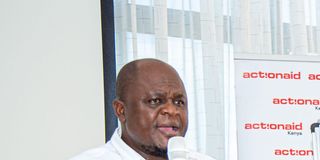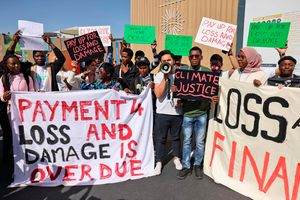COP 28, make or break decisions for the planet!

Kitasi Wanga, programme manager for Resilient Livelihoods and Emergencies, ActionAid International Kenya.
What you need to know:
- At COP26 in 2021, governments and private philanthropies pledged nearly $2 billion to support Indigenous Peoples and local communities’ tenure rights.
- Last year’s COP27 created a new “loss and damage” fund to help vulnerable communities respond to climate disasters.
World leaders have gathered in Dubai since November 30, 2023 for another round of climate talks for the 28th round until 12th December 2023. COP 28 comes at a time when the global geopolitical context defined by the Russia-Ukraine conflict, COVID-19, deepening debt crisis, and the food and cost-of-living crisis have exacerbated the effects of the climate crisis, now universally accepted as the 21st-century threat to the survival of humanity and the health of the planet.
How different is COP 28 from previous COPs?
The science is clear: the world is not on track as per the Paris Agreement 2015, whose overarching goal is to hold “the increase in the global average temperature to well below 2°C above pre-industrial levels” and pursue efforts “to limit the temperature increase to 1.5°C above pre-industrial levels.”
The 2023 Emissions Gap Report warns that the world is heading for 2.5°C—2.9°C of warming if governments do not agree to and implement more ambitious targets by 2035. Yet findings from the 2023 Production Gap Report reveal that governments still plan to produce more than double the amount of fossil fuels than is consistent with limiting global warming to 1.5°C.
Africa’s greatest priority remains to be adaptation to the effects of the climate crisis. We remain to be energy insufficient and food insecure amidst the crisis. Over the years, health as a critical area has missed in discussions at COP. Lastly, Climate financing has started changing, and more focus is being put on more of private financing than on public financing.
At COP26 in 2021, governments and private philanthropies pledged nearly $2 billion to support Indigenous Peoples and local communities’ tenure rights. Last year’s COP27 created a new “loss and damage” fund to help vulnerable communities respond to climate disasters.
The world needs an ambitious outcome to accelerate the energy transition and put it on a path to achieving the goals of the Paris Agreement. For an ambitious and critically needed energy and agriculture outcome at COP 28, parties must agree to increase clean energy, phase out fossil fuels, accelerate agricultural adaptation and operationalize loss and damage framework.
On November 30, 2023, COP28 began with a major announcement where the world governments finally announced the operationalization of the loss and damage fund. The announcement was celebrated by observers at COP 28 – mainly the civil society, terming it a big moment and an important first step towards addressing climate impacts.
Are COP 28’s decisions in the right direction so far?
As ActionAid Kenya, while we recognize there is much more work to be done on the loss and damage fund and the need for the World Bank to prove its ability to ensure that funds get to the vulnerable communities, we welcome its operationalization at COP28. It is a starting point where we hope it can only get better.
In less than two months, a buildup summit to COP 28 happened in Kenya, dubbed the first Africa Climate Summit hosted by HE. President William Ruto the current Chair of the Committee of African Heads of State and Government on Climate Change (CAHOSCC) under the auspices of the African Union. Attended by an estimated 5,000 delegates from across the continent and the global south, the Summit sought to unite African Heads of State to set priorities for Africa for COP 28 while highlighting opportunities and barriers for climate investment in the African continent.
Days later, towards the end of week one, during actions staged by civil society such as the “Fill the Loss and Damage Fund now, attended by this writer, Civil society organizations called out on governments for their support for carbon credit deals and disinterest in phasing out fossil fuels. They criticized the world leaders' “doublespeak” character for agreeing to operationalize the loss of damage fund but, on the other hand, failing to adopt a decarbonizing pathway.
Climate campaigners continue condemning the polluting influence of the fossil fuel industry on the COP process. With COP28 presided over by an oil executive who is the CEO of Abu Dhabi National Oil Company (ADNOC), it is beyond satire for such a person to lead the world’s climate crisis response.
The writer is the programme manager for Resilient Livelihoods and Emergencies, ActionAid International Kenya.




